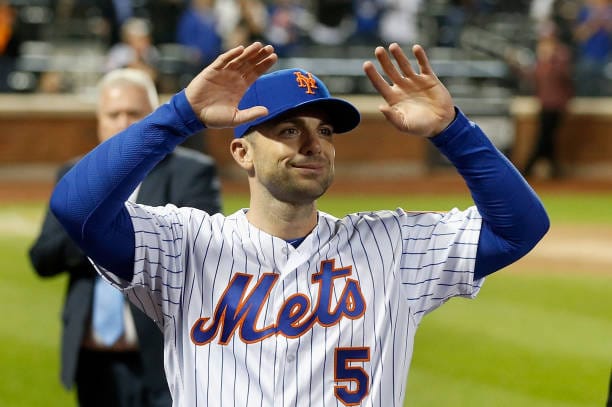Was David Wright a Hall of Fame Talent or Just Shy? The Debate Continues!
We dive deep into the career of David Wright, one of baseball's brightest stars from 2004 to 2018, to analyze whether the beloved New York Met third baseman deserves a spot in the Baseball Hall of Fame.

David Wright: a name that resonates fondly with New York Mets fans and baseball purists alike. Known for his consistency, athleticism, and charisma, Wright carved out an impressive career in Major League Baseball from 2004 to 2018. But a question continues to linger among baseball enthusiasts: Is David Wright Hall of Fame material? Today, we analyze his incredible career, his accolades, and where he stacks up against baseball’s legends to see if he makes the cut for Cooperstown.
Wright’s loyalty to the New York Mets was steadfast throughout his 14-season career. He played nearly 1,600 games, stepping to the plate close to 6,900 times. With a batting average of .296, an on-base percentage of .376, and a slugging percentage of .491, he flaunted an impressive OPS of .867. His adjusted OPS of 133 speaks volumes about his productivity compared to his contemporaries. Moreover, his career WAR (Wins Above Replacement) stands at 49.2 - a robust figure showcasing his crucial contributions to the Mets during his tenure.
Throughout his career, Wright amassed nearly 1,800 hits, over 650 of which were extra-base hits, alongside 1,000 RBIs and runs scored—a testament to his consistency as an offensive force. His ability to swipe nearly 200 bases reflects his prowess as a five-tool player, emphasizing his athleticism beyond just swinging the bat.
It’s when you narrow the lens on his prime years from 2005 to 2014 that Wright’s brilliance truly shines. During this period, he was one of the most dominant third basemen in MLB, ranking first or second across nearly every offensive category for his position—including WAR, OPS, and adjusted OPS. Wright’s knack for blending power, speed, and defense was particularly evident in his 2007 season when he reached the coveted 30-30 milestone (30 home runs, 30 stolen bases) while claiming a Gold Glove at third base.
When comparing Wright to his contemporaries, his ranking among players with at least 5,000 plate appearances from 2004 to 2016 places him firmly inside the elite. He was top-10 material in OPS and adjusted OPS, while also ranking within the top 20 across metrics like RBIs, runs scored, and hits. At his peak, Wright was undoubtedly among the top eight players in baseball, not just limited to his position or league.
But as stellar as Wright’s prime years were, his career narrative shifts when viewed through the lens of longevity. A crippling back injury significantly curtailed his time on the field. After his last full season in 2014, Wright only managed a measly 341 plate appearances in the remaining four seasons of his career. Historical context reveals how this impacts his Hall of Fame case - of the 77 Hall of Fame position players whose careers began after World War II, only two (Jackie Robinson and Ralph Kiner) accumulated fewer plate appearances than Wright. However, those cases present exceptions: Robinson's late debut due to racial segregation and Kiner’s unparalleled early dominance that overshadowed his brief career.
While Wright’s analytical stats like OPS and adjusted OPS rank within the top 10% among hitters with similar plate appearances, his fewer career milestones severely cripple his Hall of Fame case. Nearly all his cumulative career stats rank on the lower end compared to those already enshrined in Cooperstown, a limitation Wright himself couldn’t overcome due to his injuries.
Even defensively, Wright tells a complicated story. Known for his spectacular plays at third base, his advanced defensive metrics show middling consistency. While he delivered Gold Glove-caliber seasons, several years had him posting negative defensive WAR, indicating fluctuating reliability in the field.
Could he be described as the best hitting third baseman not yet elected into the Baseball Hall of Fame? Perhaps. With the sixth-highest adjusted OPS of any third baseman with significant plate appearances, Wright’s prowess as a hitter is undeniable. But even beyond metrics like WAR and OPS, Hall of Fame voters often look for dominance, and while Wright was one of the best five-tool players during his prime, he lacked superiority in any one facet over his peers.
So where does that leave us? Simply put, David Wright is one of baseball’s greatest 'what could have been' stories. If not for his back injury, there’s little doubt he would have surpassed critical career milestones and been a shoe-in for the Hall of Fame. But without them, his case becomes a tough sell. His performance during his peak years was brilliant—worthy of adoration and admiration—but for many voters, the cumulative aspect of a player’s career is just as important.
To Mets fans, Wright will forever be “The Captain,” a beacon of loyalty, resilience, and talent. For the Hall of Fame, however, there's honor in simply being considered, even if the final answer is ‘no.’ Just as injuries may have stolen the remainder of his career, they’ve also likely stolen his ticket to Cooperstown. Sometimes, greatness is better left cherished than measured.
Maintained by Vaccaro Marketing




